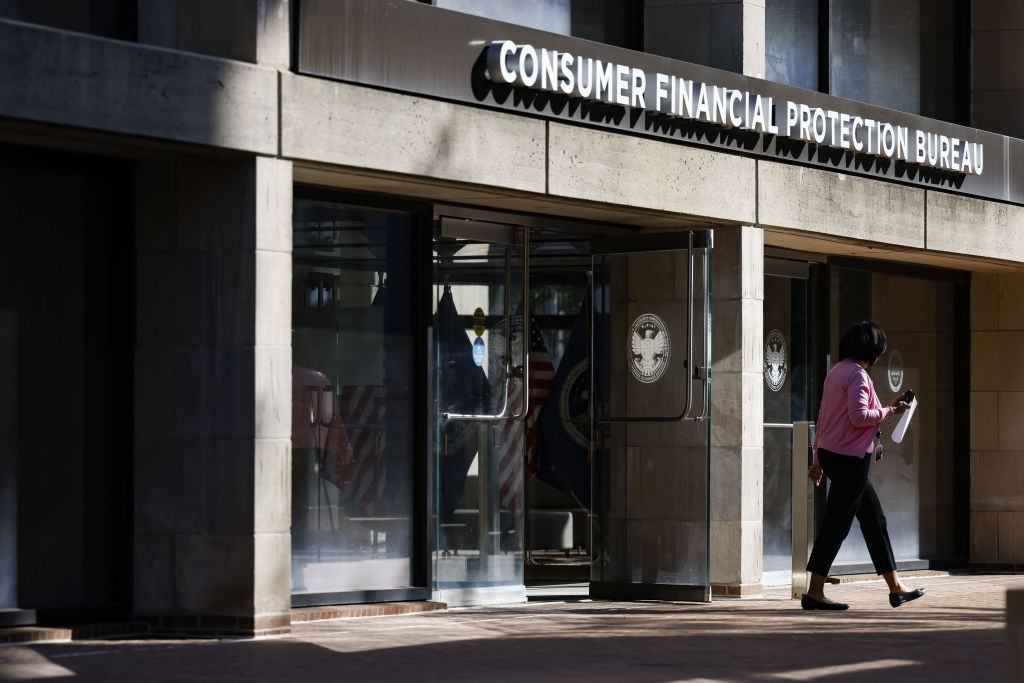The Supreme Court heard a new case challenging the Consumer Financial Protection Bureau that could upend federal power

In a year where global financial turmoil has once again toppled banks and shaken consumer confidence, a related battle with huge implications is quietly playing out in court. The Supreme Court heard arguments on Oct. 3 in a case that could jeopardize the survival of the Consumer Financial Protection Bureau, the federal agency established in the wake of the 2008 financial crisis to help defend Americans against unfair and deceptive lending practices. At risk is the most important consumer protection law passed in a half century. It is all part of a broader legal attack against the agencies that protect public health, the environment, and fair markets—a trend that goes well beyond banking practices.
[time-brightcove not-tgx=”true”]This latest threat to the CFPB follows a cascade of court decisions and political maneuvers that have stripped power from federal agencies over decades. These attacks do not simply tinker around the edges of agency authority. As Justice Jackson noted in oral arguments, cases like these wrongly suggest that the judiciary is a “super-legislature,” able to, “agency by agency,” give a “thumbs up or thumbs down” without critical limits. Together, these efforts represent an existential threat to the administrative state—one that we must guard against to preserve the government’s ability to regulate, respond to national crises, administer critical public programs, and, as with the CFPB, protect vulnerable Americans from being gouged by creditors and trapped in insurmountable cycles of debt.
The case involves the arcane topic of how the banking consumer agency pays its bills. When it was established, Congress protected the agency against a boom-and-bust cycle of funding and made sure that banking lobbyists could not hold its appropriation hostage each year. Legislators passed a law that had the agency be independently funded through the Federal Reserve System rather than through annual congressional appropriations. In an extraordinary decision last October, the Fifth Circuit held that the CFPB’s funding scheme violates the Constitution’s Appropriations Clause, prompting an appeal from the Biden Administration to the Supreme Court. The justices are being asked to cut off the agency’s current source of money.
This makes no sense on its own terms. Congress, after all, passed the law that created this funding stream. It reflects elected officials’ belief that ensuring independence this way would serve consumers. Other agencies have long been funded through similar means. Almost all financial regulators draw funds from fees and investments, rather than solely from the Treasury. As several justices acknowledged at oral argument, analogous funding schemes are well rooted in America’s history.
The immediate impact would be felt at the consumer agency itself. A bad ruling could nullify every action it has taken to date in the most extreme scenario, or it could effectively freeze the CFPB’s ability to function until Congress passes new legislation. It could also endanger other agencies with funding arrangements that fall outside the annual congressional appropriations process—including the Federal Deposit Insurance Corporation, the Federal Reserve itself, the U.S. Postal Service, and programs such as Medicare and Medicaid. The government’s lawyer observed at oral argument that a sweeping remedy in this case could create “profound disruption” in markets and hurt both consumers and regulated entities.
Indeed, this disruptive impact may be exactly what’s behind the lawsuit. In recent years the Supreme Court has begun to sharply undermine federal agencies’ ability to act. It stymied the federal government’s efforts to respond to an array of contemporary crises, from climate change to the pandemic, by invoking a novel and ill-defined doctrine that limits agencies’ authority to regulate on issues of “vast” political and economic significance. In 2020, it expanded the president’s power to fire the CFPB director. It recently agreed to hear a case that could end court deference to agencies’ reasonable interpretations of ambiguous statutes.
This nerve-rattling legal assault comes amid a broader erosion of government’s capacity to act for the public good. Stagnant appropriations, periodic government shutdowns, and a steady series of hiring freezes have injured key agencies over the past several decades. Part of that atrophy stems from the periodic debt limit standoffs that now seem a depressing part of political brinksmanship. In 2011, a stalemate culminated in a deal between Congress and the Obama Administration that starved vital services across the government. The Brennan Center recently published research showing that spending cuts driven by that deal wrought substantial damage on federal agencies over the last 12 years. Most cabinet agencies were left with fewer federal employees at the close of 2022 than in 2010. At the Agriculture, Interior, and Housing and Urban Development departments, and at the Environmental Protection Agency, staffing levels plunged by as much as one fifth, even as the country’s population grew. All this takes its toll on effectiveness, with rules and services slowing to a crawl in some areas.
Congress’s decision to ensure steady funding for the consumer protection agency has helped it do better than many other agencies on some metrics. While the CFPB suffered harm during the Trump administration, it has not seen the same levels of staff attrition as other agencies over the past decade. Instead, it has grown modestly to keep pace with new challenges since 2015, according to federal data. By electing to give agencies such as the CFPB a predictable revenue stream in the laws that created them, a prior Congress situated such agencies above the partisan bickering in its own backyard and protected them from death by a thousand cuts.
As federal agencies face an onslaught of challenges from courts and some corners of Congress, they need added support to carry out critical tasks and protect Americans. The CFPB is no canary in the coal mine—it is just the latest target.